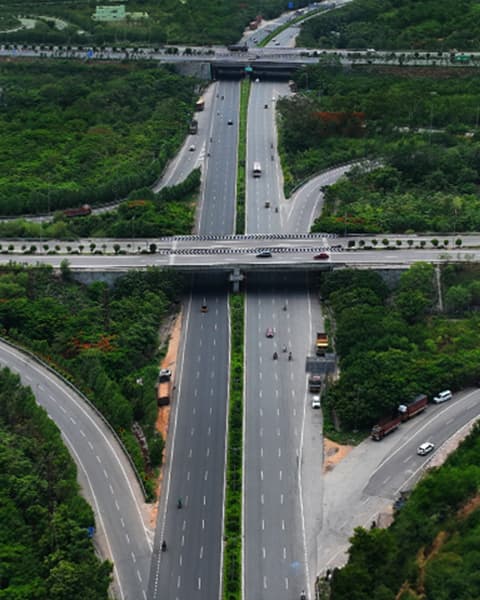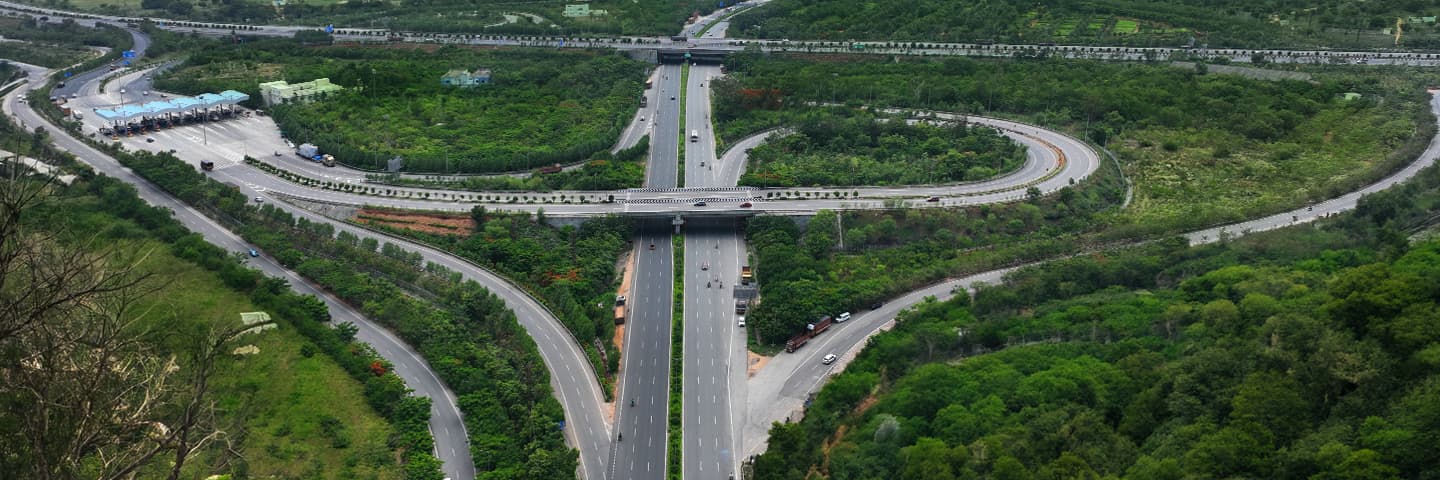Number of Lanes
4
Distance
35.65 Km
Original Concession Period
23 Years

The Four-Laning of Hyderabad-Yadgiri Section of NH-163 (old NH-202) in the state of Telangana, developed under NHDP Phase-III on a Design, Build, Finance, Operate, and Transfer (DBFOT) Toll Basis covers a stretch from Km 18.600 to Km 54.254 and follows the existing alignment to a major extent but deviates at three locations: Aushapur bypass, Ghatkesar bypass, and Bhongir bypass. The alignment passes through a mix of plain and rolling terrain, including urban and rural areas. Land use along the existing carriageway is primarily urban/rural settlements and agriculture.
The villages and towns along the project highway have experienced economic prosperity due to commercial activities. The road connects to the Yadagirigutta temple, a significant pilgrimage site in South India, and also serves commercial traffic related to sand mines in Warangal district.
The project corridor encompasses 3 bypasses with a combined length of approximately 16.100 km, 2 railway overbridges (ROBs), 5 major bridges, 1 minor bridge, and 2 truck laybys. Additionally, the total length of the service road is 45.594 km, ensuring uninterrupted and superior driving comfort for road users without any diversions or blockages.
The road project was executed by M/s Hyderabad Yadgiri Tollway Pvt Ltd. It commenced tolling operations on December 10, 2012, and received its completion certificate on June 27, 2015.
Benefits of the Project Road
Enhanced Connectivity: The road project has greatly improved connectivity by linking previously isolated regions with major urban centres. This enhanced connectivity facilitates the smoother movement of goods, services, and people, fostering economic growth and development.
Improved Safety: Safety enhancements, including improved signage, better lighting, wider lanes, and the installation of safety measures like Power Blinkers at Major Junctions and water-filled drum barriers, have resulted in a notable reduction in accidents and fatalities on the road. These improvements make travel safer for all road users.
Reduced Travel Times: The modernization of the project road has led to a substantial reduction in travel times, benefiting both daily commuters and long-haul transportation. This increased efficiency not only saves time but also reduces fuel consumption, contributing to cost savings and environmental benefits.
Economic Growth: The upgraded road infrastructure has attracted investments and stimulated economic growth by making the region more accessible to businesses. This, in turn, has led to job creation and increased economic opportunities for local communities, positively impacting their quality of life.
Impact on Road Users
Commuters: Commuters now enjoy shorter travel times and increased safety, leading to an improved quality of life. Reduced travel times and enhanced safety measures make daily commuting more efficient and secure.
Truck Drivers: Long-haul truck drivers benefit from decreased transit times and lower operating costs, which enhance the efficiency of the logistics industry. This not only reduces transportation costs but also ensures more timely and reliable deliveries.
Tourists: The temple city of Yadagiri Gutta, with its unique beauty and pleasant climate throughout the year, is located conveniently close to Hyderabad, the capital city of Telangana. The high flow of devotees and pilgrims visiting the temple is primarily due to its proximity to the capital city, and the project road has become the most convenient and accessible route for travellers heading to this significant religious and tourist destination. This enhanced accessibility has not only improved the travel experience for visitors but has also benefited the local economy by driving tourism-related businesses.
Impact on Communities
Economic Development: Local communities have experienced economic growth due to increased economic activity, which includes the establishment of new businesses, manufacturing ventures, and tourism-related enterprises. This has led to the economic prosperity of the region.
Employment Opportunities: The project has created employment opportunities for residents in various sectors, including construction, maintenance, and related works associated with the project's development and maintenance activities. This includes job opportunities in toll operations, contributing to local employment.
Infrastructure Development: The project has catalyzed the development of ancillary infrastructure, such as hotels, restaurants, and service stations, benefiting local entrepreneurs. This not only enhances the convenience for road users but also stimulates local business growth.
Environmental Impact: The project is a 100% green highway initiative, designed to provide the utmost satisfaction to road users. This emphasis on sustainable practices aligns with environmental conservation and contributes to a better travel experience. Over 45,000 trees have been planted along the road corridor, contributing to environmental conservation and enhancing the aesthetic value of the region.
Accolades
The project has been certified under six ISO certification categories:
- ISO 9001:2015 Quality Management System
- ISO 14001:2015 Environmental Management System
- ISO 39001:2012 Road Traffic Safety Management System
- ISO 45001:2018 Occupational Health and Safety Management System
- ISO 31000:2018 Risk Management
- ISO 27001:2022 Information Security and Management System
Hyderabad - Yadgiri Tollway Private Limited (HYTPL)
CIN: U45203TN2010PTC164166

